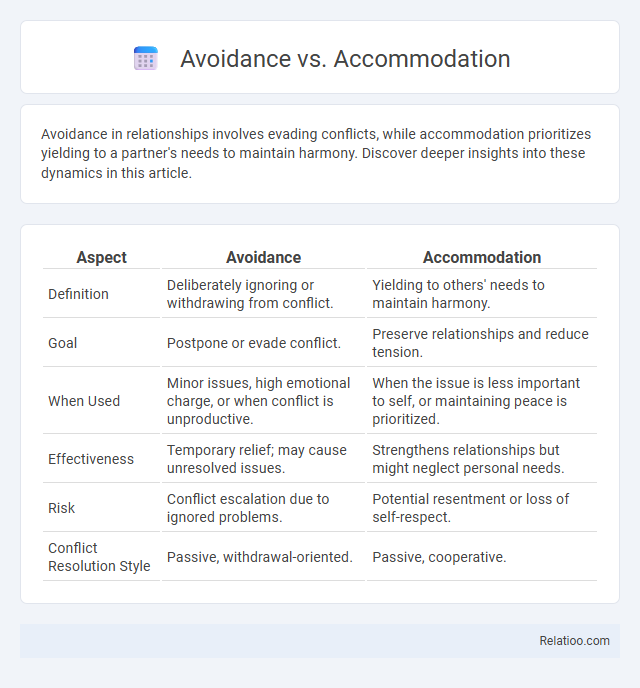Avoidance in relationships involves evading conflicts, while accommodation prioritizes yielding to a partner's needs to maintain harmony. Discover deeper insights into these dynamics in this article.
Table of Comparison
| Aspect | Avoidance | Accommodation |
|---|---|---|
| Definition | Deliberately ignoring or withdrawing from conflict. | Yielding to others' needs to maintain harmony. |
| Goal | Postpone or evade conflict. | Preserve relationships and reduce tension. |
| When Used | Minor issues, high emotional charge, or when conflict is unproductive. | When the issue is less important to self, or maintaining peace is prioritized. |
| Effectiveness | Temporary relief; may cause unresolved issues. | Strengthens relationships but might neglect personal needs. |
| Risk | Conflict escalation due to ignored problems. | Potential resentment or loss of self-respect. |
| Conflict Resolution Style | Passive, withdrawal-oriented. | Passive, cooperative. |
Understanding Avoidance and Accommodation
Understanding avoidance involves recognizing behaviors aimed at evading uncomfortable situations or conflicts, often leading to unresolved issues and increased stress. Accommodation entails yielding to others' needs or desires, which can preserve harmony but might suppress one's own interests or create imbalance in relationships. Distinguishing avoidant tendencies from accommodative actions is essential for developing effective communication and maintaining healthy interpersonal dynamics.
Key Differences Between Avoidance and Accommodation
Avoidance involves completely steering clear of conflict or difficult situations, whereas accommodation focuses on yielding to others' demands to maintain harmony. Your choice between avoidance and accommodation impacts relationship dynamics significantly, as avoidance prioritizes self-protection and emotional distance while accommodation emphasizes cooperation and concession. Recognizing these key differences helps you decide when to protect your boundaries or foster collaboration.
Psychological Roots of Avoidance
Avoidance behavior often stems from deep-seated psychological roots such as fear of failure, rejection, or anxiety, which prompts individuals to evade stressful or threatening situations. Accommodation involves adapting one's behavior or thoughts to reduce conflict, often driven by a need for social acceptance or fear of confrontation. You can better understand these patterns by recognizing how internal fears shape both avoidance and accommodation strategies in your daily interactions.
Motivations Behind Accommodation
Accommodation involves adjusting your behavior or opinions to align with others to maintain harmony, driven by the motivation to preserve relationships and reduce conflict. Unlike avoidance, which seeks to sidestep issues entirely, accommodation prioritizes social cohesion, often sacrificing personal preferences for the group's benefit. Understanding your motivation behind accommodation can enhance interpersonal dynamics and promote constructive communication without undermining your own needs.
Impact on Personal Relationships
Avoidance in personal relationships often leads to unresolved conflicts, fostering emotional distance and mistrust between partners. Accommodation, while promoting harmony by yielding to others' needs, can result in resentment and overlooked personal boundaries when overused. Balancing assertive communication with empathy is crucial to maintaining healthy connections and preventing the negative consequences associated with these conflict management styles.
Conflict Resolution: Avoidance vs Accommodation
In conflict resolution, avoidance involves ignoring or withdrawing from the conflict to prevent escalation, often leading to unresolved issues. Accommodation prioritizes maintaining harmony by yielding to others' demands, which can preserve relationships but may suppress personal needs. Understanding when to use avoidance or accommodation depends on the conflict's context and desired long-term outcomes, balancing relationship dynamics and personal interests.
When Avoidance Might Be Beneficial
Avoidance can be beneficial when confronting situations likely to cause unnecessary stress or harm, allowing you to conserve energy and maintain emotional stability. Accommodation works best in preserving harmony by yielding in less critical conflicts, preventing escalation while fostering cooperation. Understanding when avoidance is appropriate helps you prioritize important battles and protect your well-being.
Risks Associated With Over-Accommodation
Over-accommodation in communication can lead to misunderstandings, resentment, and diminished trust as individuals may feel patronized or undervalued. This behavior risks reinforcing stereotypes and reducing authentic interactions, impacting both personal and professional relationships. Recognizing and addressing over-accommodation is essential to fostering mutual respect and effective dialogue.
Building Healthier Coping Strategies
Avoidance, accommodation, and confrontation each represent different coping mechanisms with unique impacts on mental health. Avoidance can lead to increased stress by suppressing emotions, while accommodation may foster unhealthy dependency, limiting your growth in resilience. Building healthier coping strategies involves recognizing these patterns and actively practicing assertive communication and problem-solving skills to promote emotional well-being.
Choosing the Appropriate Approach
Choosing the appropriate approach between avoidance, accommodation, and confrontation depends on the context and desired outcome of conflict resolution. Avoidance can be effective for minor issues or when emotions run high, while accommodation prioritizes maintaining relationships by yielding to others' needs. Understanding Your goals, whether preserving harmony or asserting your position, will guide selecting the right strategy to balance short-term peace with long-term satisfaction.

Infographic: Avoidance vs Accommodation
 relatioo.com
relatioo.com